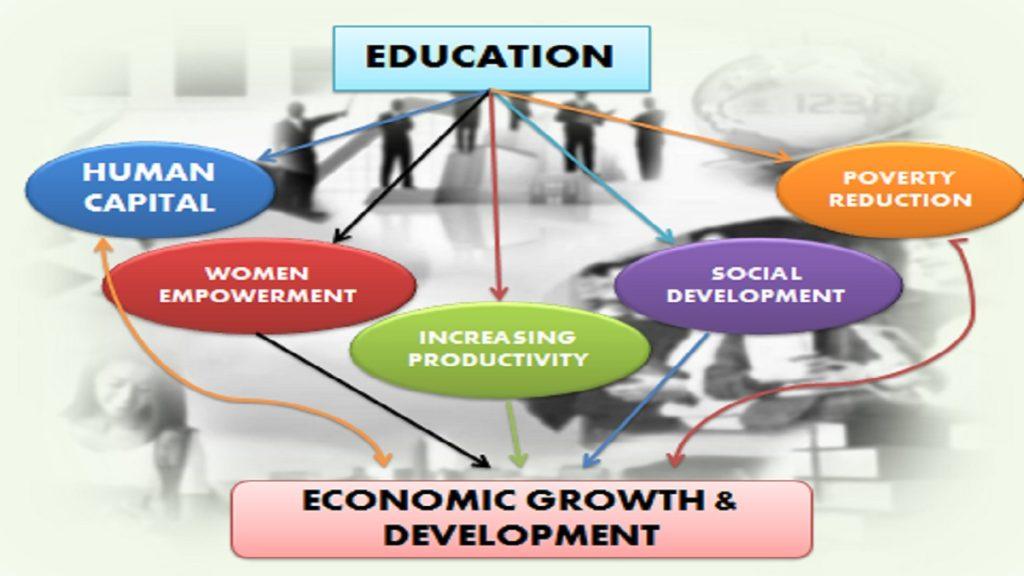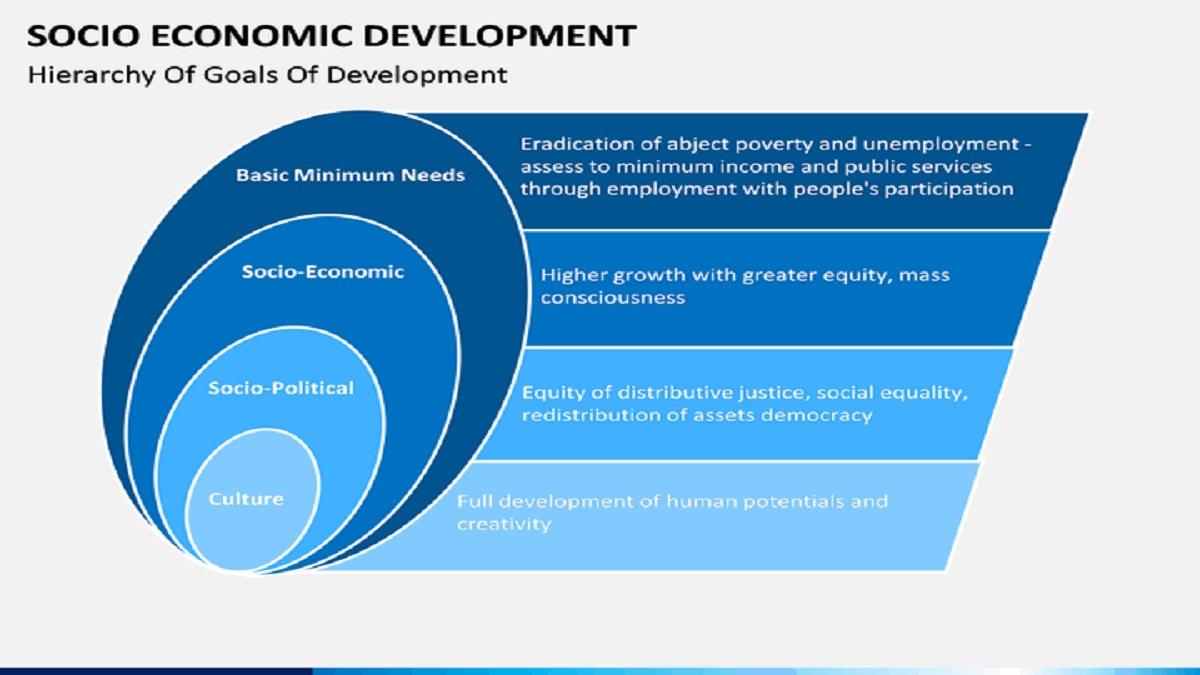Higher education has a major impact on the socio-economic development of a country. It is an essential component of the nation’s development strategy, as higher education enables individuals to acquire the skills, knowledge and abilities needed to drive economic growth and innovation. It also plays a key role in helping countries build their human capital base, which is essential for sustained socio-economic development. In this blog post, we will explore how higher education affects socio-economic development of a country.
Building a Knowledge-Based Economy: The Role of Higher Education
A knowledge-based economy is one in which a country’s economic growth is driven by the creation, dissemination, and utilization of knowledge. This means that countries with a well-educated population and a strong focus on higher education tend to have a more developed knowledge-based economy. This, in turn, leads to increased socio-economic development and improved quality of life for citizens.
The role of higher education in building a knowledge-based economy cannot be overstated. Institutions of higher learning play a critical role in the development of the skills and knowledge required to create and utilize new technologies, drive innovation, and create high-paying jobs.
In addition, higher education is essential for attracting foreign investment and increasing exports. This is because a highly skilled workforce can help to drive competitiveness in the global marketplace, allowing countries to produce higher-quality goods and services.
Ultimately, investing in higher education is one of the most effective ways to promote socio-economic development. By fostering the skills and knowledge required to drive innovation and economic growth, higher education has the potential to transform the trajectory of countries and create a brighter future for all citizens.
Higher Education and Economic Growth: A Positive Relationship
The link between higher education and economic growth is well-established. Studies have consistently shown that countries with higher levels of education tend to experience greater economic growth and development. This positive relationship is not a coincidence – it is a result of the important role that higher education plays in developing the human capital necessary for economic success.
Higher education provides individuals with the skills, knowledge, and experience needed to succeed in today’s rapidly changing global economy. It prepares graduates to think critically, innovate, and adapt to new challenges. As a result, individuals with higher levels of education are more likely to be employed in high-paying, high-skilled jobs and to contribute more to the economy.
Moreover, higher education also contributes to economic growth by driving research and innovation. Research conducted by universities often leads to the development of new technologies, products, and services that have the potential to transform entire industries. This research can also result in patents and other intellectual property that can be licensed and monetized, generating additional income for universities and their communities.
Furthermore, higher education can play a key role in fostering entrepreneurship and job creation. Graduates with a strong entrepreneurial spirit are more likely to start their own businesses, which can create new jobs and generate additional economic activity. In addition, higher education can provide individuals with the skills and knowledge necessary to succeed in the modern workforce, which can lead to higher productivity and economic growth.
In summary, higher education is essential to driving socio-economic development. It provides individuals with the skills and knowledge necessary to succeed in today’s economy, fosters innovation and research, and contributes to entrepreneurship and job creation. Therefore, investing in higher education is critical to ensuring long-term benefits for socio-economic progress. If you are looking for Home Tutors in Lahore, you can check out some reliable home tutor services to give your education a boost.
Research and Innovation: Driving Socio-Economic Development
Research and innovation are key components of higher education that play a critical role in driving socio-economic development in a country. Through higher education institutions, individuals can develop the skills, knowledge, and expertise needed to advance research and innovation in their respective fields, resulting in the creation of new ideas and solutions that can benefit society.
At the forefront of research and innovation, universities can serve as the catalyst for technological advancements, scientific discoveries, and breakthroughs in various industries, including healthcare, energy, agriculture, and more. These advancements not only contribute to the growth of the economy but also have a positive impact on the quality of life of individuals.
One example of how research and innovation can drive socio-economic development is the use of technology in education. With the rise of home tutor services and online learning platforms, individuals have access to a wider range of educational opportunities, regardless of their geographic location. This advancement in education technology has resulted in improved access to education, particularly for those living in rural or underserved areas, and has the potential to drive long-term socio-economic development.
Innovation can also lead to job creation, another key factor in socio-economic development. Higher education institutions that prioritize entrepreneurship education and provide support for startups and small businesses can empower individuals to create their own employment opportunities. This can have a significant impact on the economy, particularly in developing countries, where unemployment rates can be high.
Overall, research and innovation are critical drivers of socio-economic development, and investing in higher education institutions can lead to long-term benefits for society as a whole. By fostering a culture of innovation, supporting entrepreneurship, and providing access to education and training, higher education can contribute to the growth of the economy, create new job opportunities, and improve the quality of life for individuals.

Fostering Entrepreneurship: Higher Education’s Impact on Job Creation
One of the most significant ways that higher education can impact socioeconomic development is through the creation of new jobs and opportunities. One of the best examples of this is through the fostering of entrepreneurship, which can provide individuals with the tools and skills necessary to start their own businesses and create jobs for others.
Entrepreneurship education is often seen as a critical aspect of higher education, as it teaches individuals the necessary skills to create and run a successful business. These skills include things like critical thinking, problem-solving, and risk management, which are all essential qualities for any entrepreneur. Additionally, many universities now offer entrepreneurship courses, programs, and even incubators that help individuals turn their ideas into profitable businesses.
Furthermore, higher education institutions can also create an environment that encourages entrepreneurship and innovation. For instance, universities can partner with local businesses, investors, and other organizations to provide resources, mentorship, and funding for students who want to start their own companies. This type of support can help bridge the gap between education and real-world business practices, allowing entrepreneurs to turn their ideas into reality.
Moreover, entrepreneurship can lead to job creation, which is a crucial element in promoting socio-economic development. The creation of jobs can help to reduce unemployment rates, poverty, and income inequality, as more people become employed and contribute to the economy. This is especially important in developing countries, where unemployment rates can be high, and job opportunities may be limited.
In summary, higher education’s impact on socioeconomic development through entrepreneurship is substantial. By providing individuals with the skills and knowledge to start their own businesses, and fostering an environment that encourages innovation, higher education can help to create new jobs, reduce unemployment rates, and promote socio-economic progress. So, if you are looking for ways to start your own business, consider exploring the entrepreneurship programs at your university or hiring home tutors in Islamabad who specialize in entrepreneurship. With the right skills and resources, anyone can become an entrepreneur and contribute to the growth of their community and country.
Higher Education as a Catalyst for Social Mobility and Equality
One of the most important ways in which higher education impacts socioeconomic development is by catalyzing social mobility and equality. Higher education has the power to transform the lives of individuals and communities by providing them with the knowledge, skills, and opportunities necessary to advance and succeed.
Access to higher education is critical for social mobility and equality. However, it is not always easy for everyone to have access to quality higher education. In many cases, factors such as socioeconomic status, geographic location, and other personal circumstances can act as barriers to higher education. In such situations, home tutor services can play an important role in providing equal educational opportunities to students from all backgrounds. Home Tutors in Rawalpindi, for example, offer quality tutoring services that can help students achieve their academic goals and access higher education opportunities.
When individuals have access to higher education, they are better equipped to achieve upward social mobility and to improve their economic well-being. This, in turn, can contribute to the socio-economic development of the country as a whole. By increasing access to higher education, we can help to reduce inequalities and promote a more inclusive society.
In addition to improving social mobility and equality, higher education also has a broader impact on society. Higher education institutions are often hubs of research and innovation, producing new ideas and technologies that drive socio-economic development. Moreover, the skills and knowledge that students gain through higher education can be applied to a wide range of industries and sectors, further contributing to economic growth.
In summary, higher education is a critical component of socioeconomic development, playing a key role in promoting social mobility and equality, driving research and innovation, and contributing to economic growth. Through home tutor services and other initiatives that promote access to higher education, we can work towards building a more inclusive and prosperous society for all.
Investing in Higher Education: Long-term Benefits for Socio-Economic Progress
One of the key factors that determine a country’s level of socioeconomic development is its investment in higher education. Higher education has a range of benefits that can impact various aspects of a country’s economy and society in the long run. Here are some of the long-term benefits of investing in higher education:
1. Higher quality human capital:
One of the main benefits of investing in higher education is that it produces a higher quality of human capital. Higher education institutions help to produce graduates who are more skilled, knowledgeable, and adaptable, making them valuable assets to any industry they enter. This not only contributes to individual development but also enhances the quality of a country’s workforce, leading to higher productivity, innovation, and overall economic growth.
2. Promotes research and innovation:
Higher education institutions play a significant role in promoting research and innovation. By providing opportunities for students and researchers to conduct advanced research, higher education institutions create an environment that fosters the development of new technologies, new products, and new ideas. This contributes to the overall progress of a country, leading to economic growth, job creation, and improved living standards.
3. Increases social mobility:
Investing in higher education is one of the most effective ways to promote social mobility. Higher education institutions provide opportunities for individuals from disadvantaged backgrounds to obtain the skills and knowledge needed to achieve success in their chosen fields. This helps to break the cycle of poverty, increase social mobility, and reduce income inequality, ultimately contributing to overall social and economic progress.
4. Provides a competitive advantage:
Countries that invest in higher education gain a competitive advantage in the global economy. By producing highly skilled and innovative graduates, these countries can attract foreign investment, create new industries, and promote sustainable economic growth. This contributes to the development of a strong and diversified economy, which can withstand economic shocks and crises.











